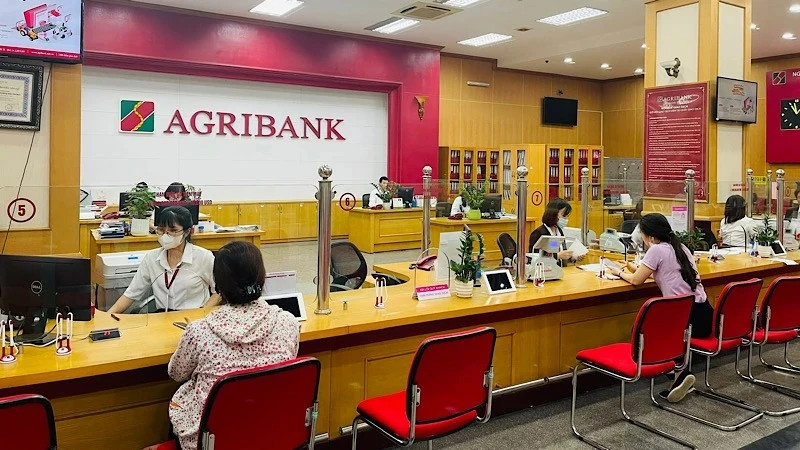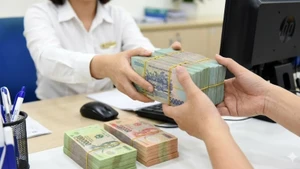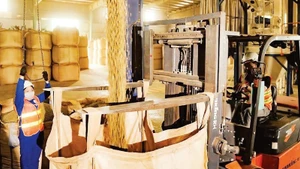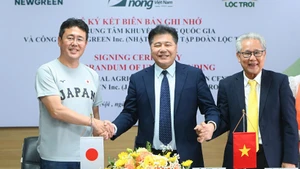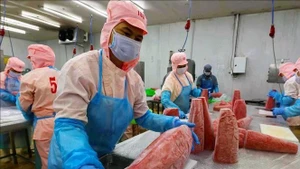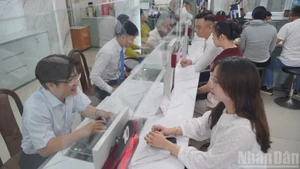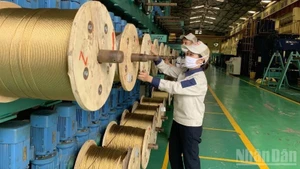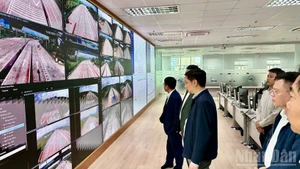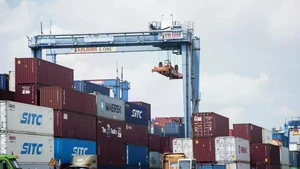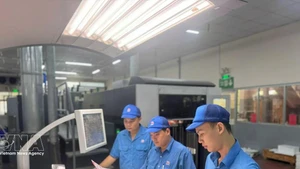According to the State Bank of Vietnam, after over a year of implementing the 120 trillion VND social housing credit package, only 34 out of 63 provinces and cities have announced 78 eligible projects for preferential loans on their electronic portals. Banks have disbursed 1.344 trillion VND, including 1.295 trillion VND to investors in 12 projects and 49 billion VND to homebuyers in five projects.
Notably, Agribank currently leads in disbursement with nearly 650 billion VND for project investors and over 40 billion VND for social housing buyers.
Specifically, Agribank has approved financing for projects such as the Thong Nhat Smart City social housing project in Yen Phong District; the social housing project in Pho Moi Town, Que Vo District, Bac Ninh Province; the social housing project in the Bank Hill residential area in Hạ Long City, Quang Ninh Province; the social housing project in Duy Tien Town, Ha Nam Province; and the social housing project in Rach Gia City, Kien Giang Province, with a total loan commitment exceeding 1.5 trillion VND.
In the second quarter of 2024 alone, Agribank approved credit for three social housing projects, increasing disbursement by more than 150 billion VND to these projects and homebuyers. “In the near future, Agribank plans to continue providing over 1.5 trillion VND to five new social housing projects in Binh Dinh, Hai Phong, Lam Dong and Thai Nguyen,” said a representative from Agribank.
The Agribank representative also noted that while there are still challenges in implementing the preferential credit program that needs to be addressed by various ministries and local authorities, Agribank’s initial efforts and results have contributed to alleviating difficulties and promoting a safe, healthy, and sustainable real estate market while controlling risks. The focus remains on social welfare, providing opportunities for low-income individuals to own quality housing that aligns with their economic conditions.
In reality, from the beginning of the implementation, the 120 trillion VND credit package was expected to significantly boost the real estate market, especially in the social housing segment. However, after more than a year, the disbursement results of this credit package remain modest, having disbursed just over 1%.
To address difficulties and expedite disbursement, the State Bank of Vietnam has finalised the draft proposal and resolution to adjust the contents of the 120 trillion VND programme in Resolution No. 33/NQ-CP by reducing interest rates for homebuyers by 3-5% (while maintaining the support rate for investors at 1.5-2%). On August 2, the Ministry of Construction issued Document No. 4408/BXD-QLN, agreeing with the State Bank’s proposal.
Experts note that the actions taken by regulatory agencies and commercial banks reflect a commitment across the sector to promote preferential credit for social housing as directed by the government. However, many also argue that several challenges still need to be resolved in the implementation process.
Phung Thi Binh, Deputy General Director of Agribank, shared that one reason for the slow disbursement of the 120 trillion VND package is that many projects face legal hurdles, and the eligibility criteria for social housing buyers are too narrow. Similarly, Le Ngoc Lam, General Director of BIDV, stated that current conditions for purchasing social housing are quite strict, limiting the number of eligible buyers.
Additionally, ongoing legal challenges and low profits have deterred investors from developing social housing projects. Banks also express concerns about whether loans will be granted to the correct target groups.
As a result, many banking leaders involved in the credit package suggest expanding the criteria for purchasing social housing to motivate both banks and businesses.
Dao Minh Tu, Deputy Governor of the State Bank of Vietnam, affirmed that the agency is closely monitoring and evaluating the implementation situation on a daily basis while facilitating commercial banks to disburse effectively. In addition to the credit package, the State Bank of Vietnam strongly supports and encourages commercial banks to contribute to the social housing development programme with their own resources.
This aims to assist homebuyers and investors in developing social housing projects by ensuring they have suitable loan terms, capital structures, and interest rates.
The 2023 Housing Law, effective from August 1, 2024, introduces many new points that benefit both citizens and real estate businesses, particularly changes in social housing development policies. Recently, the government issued Decree No. 100/2024/NĐ-CP detailing several provisions of the Housing Law regarding social housing development and management.
Notably, the conditions regarding housing and income levels in the decree have been adjusted to align with reality. For instance, Articles 29 and 30 of Decree No. 100 state that individuals without housing or with housing less than 15 m2 per person (this was previously set at 10 m2 per person before August 1, 2024) must have an income not exceeding 15 million VND per month per person, with a combined income for a couple not exceeding 30 million VND per month, calculated in the year leading up to the submission of their social housing application (the previous threshold was 11 million VND per month).
Additionally, the decree simplifies administrative procedures for individuals purchasing or renting social housing. Specifically, the requirement for local government verification regarding an individual’s residency, the status of their housing, and whether they have received support for land or housing under the 2014 Housing Law has been removed.
With these positive developments in legal regulations and the banking sector’s commitment, citizens and businesses hope that the social housing credit package will be disbursed promptly, effectively, and more conveniently.
